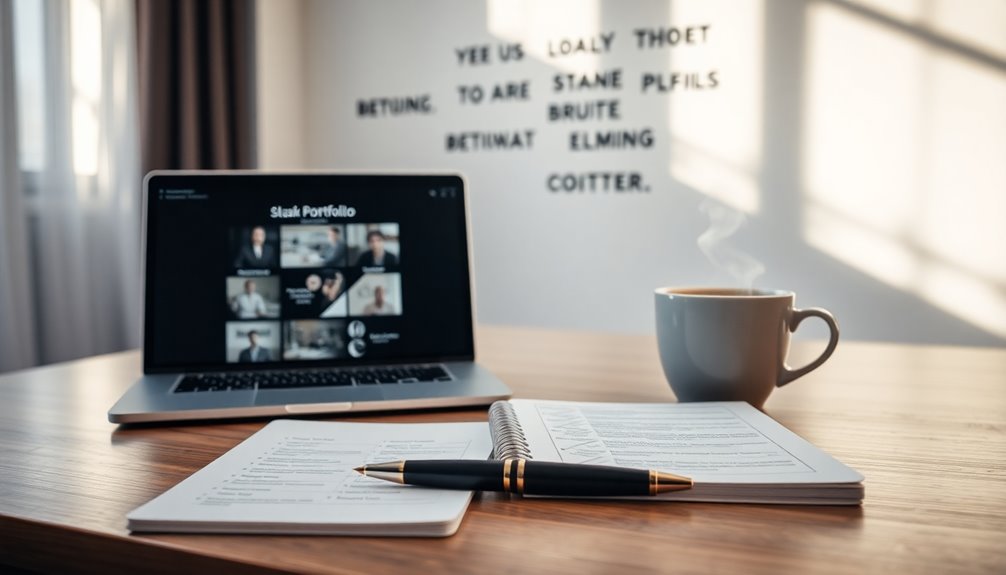Job Interview
Mastering the Work Ethic Interview Question
Transform your interview responses by mastering the work ethic question—discover the secrets to impressing hiring managers and standing out from the competition.

Mastering the work ethic interview question is key to showcasing your reliability and drive to employers. Focus on demonstrating your dedication, self-discipline, and dependability. Use specific examples, like taking on extra shifts or collaborating on team projects, to illustrate your work ethic in action. Highlight how these traits positively impact your work environment and career prospects. Remember, hiring managers look for candidates who can back up their claims with tangible proof. This approach will set you apart in a competitive market. To strengthen your preparation, explore more strategies and tips that can elevate your responses.
Key Takeaways
- Prepare specific examples that highlight your focus, dedication, and self-discipline in past work experiences.
- Practice answering common work ethic questions to enhance your confidence and articulation.
- Emphasize teamwork by sharing instances where you supported colleagues or contributed to group success.
- Demonstrate reliability by discussing your commitment to meeting deadlines and handling responsibilities effectively.
- Research industry-specific work ethic expectations to tailor your responses to the job you're applying for.
Importance of Work Ethic

Work ethic plays an essential role in shaping your professional identity and influencing hiring decisions. Hiring managers often assess your attitude through targeted work ethic questions during interviews.
By understanding the importance of work ethic, you can communicate more effectively and demonstrate your value. A positive work ethic not only boosts your chances of receiving job offers but also showcases your confidence and dedication.
When you provide specific examples that connect your work ethic to real-life situations, you create a compelling narrative that resonates with employers. This awareness reflects your commitment to success, making you a more attractive candidate.
Ultimately, a strong work ethic can set you apart in a competitive job market.
Key Characteristics to Highlight

A strong work ethic is defined by several key characteristics that you should highlight during your interview.
Focus is essential; it shows your ability to concentrate on tasks without distractions.
Dedication reflects your commitment to completing work and supporting your colleagues.
Self-discipline demonstrates how well you manage your time and responsibilities, which is vital in any role.
Dependability is about being reliable in meeting deadlines and commitments, proving you're someone others can count on.
Finally, cooperation emphasizes your willingness to collaborate with team members, fostering a positive work environment.
Crafting Effective Example Answers

Highlighting your key characteristics is just the start; backing them up with effective example answers can truly set you apart in an interview. When crafting your responses, choose specific situations that demonstrate your work ethic in action.
For instance, if you want to showcase determination, share an experience where you took on extra shifts during a staffing shortage. If you're goal-oriented, talk about the certifications you pursued to advance your career.
Make sure to emphasize your contributions, like processing invoices to support your team, or volunteering for tasks that benefit the organization. These concrete examples not only illustrate your work ethic but also make your responses memorable, showing interviewers you're both reliable and committed to success.
Benefits of Strong Work Ethic

Demonstrating a strong work ethic can greatly enhance your career prospects and professional relationships. When you show dedication, dependability, and focus, you not only improve your performance but also gain the trust and respect of your colleagues and supervisors.
This reputation can lead to more opportunities for promotions and raises as your efforts stand out in a competitive environment.
Additionally, a strong work ethic fosters improved teamwork and collaboration, as others feel motivated to match your level of commitment. Your reliability can also lead to increased recognition, making you a go-to person for important projects.
Ultimately, embodying a strong work ethic sets you apart, paving the way for a successful and fulfilling career.
Additional Interview Preparation Resources

While preparing for an interview, leveraging additional resources can greatly boost your confidence and performance.
Start by exploring lists of common work ethic questions, which can help you anticipate what interviewers might ask. Look for example answers that showcase determination, responsibility, and cooperation in real-life scenarios.
You'll find value in attitude interview questions, as they assess your mindset and approach to work. Additionally, seek guidance on crafting professional documents like cover letters or thank-you notes, as these can enhance your overall presentation.
Finally, consider tips specific to your industry, such as firefighting or healthcare, to guarantee you're ready for any unique challenges. Utilizing these resources can set you apart from the competition.
Frequently Asked Questions
How Can I Improve My Work Ethic Before an Interview?
To improve your work ethic before an interview, focus on setting clear goals and sticking to them.
You can practice self-discipline by managing your time effectively and prioritizing tasks.
Take on new challenges or responsibilities to showcase your dedication and initiative.
Reflect on past experiences where you demonstrated reliability and cooperation.
What Should I Avoid Mentioning Regarding Work Ethic?
When you're asked about your work ethic, avoid sounding like a sloth on vacation.
Don't mention laziness, procrastination, or a lack of teamwork. Skip the tales of skipping deadlines or your secret talent for creating workplace chaos.
Instead, focus on your dedication, reliability, and how you tackle challenges. Highlight your commitment to growth and collaboration, and you'll paint a much brighter picture—one that hiring managers actually want to see!
How Do Employers Define a Strong Work Ethic?
Employers define a strong work ethic as a blend of focus, dedication, and self-discipline. They look for someone who can manage time effectively, meet deadlines, and support team members.
When you demonstrate dependability and cooperation, you show your commitment to the organization's goals. By taking initiative and being responsible for your tasks, you reflect a positive attitude that boosts your chances of success in any role.
Can Personal Experiences Demonstrate Work Ethic Effectively?
They say, "Actions speak louder than words."
Personal experiences can definitely demonstrate your work ethic effectively. By sharing specific examples where you've shown dedication, focus, and dependability, you illustrate your commitment.
Think about times you've gone the extra mile or collaborated with others to achieve goals. These stories not only highlight your qualities but also resonate with employers, making your work ethic tangible and relatable during interviews.
How Can I Relate My Work Ethic to the Job Role?
To relate your work ethic to the job role, focus on specific traits that align with the position's requirements.
Highlight your dedication by sharing examples of past experiences where you met deadlines or supported colleagues.
Emphasize your self-discipline by discussing how you manage your time effectively.
Finally, demonstrate your dependability through instances where you took initiative or went the extra mile, showcasing your commitment to contributing positively to the team and organization.
Conclusion
In today's job market, a strong work ethic can make all the difference; studies show that 78% of employers value this trait above technical skills. By effectively showcasing your dedication, focus, and teamwork during interviews, you set yourself apart from the competition. Remember, it's not just about what you say, but how you illustrate your experiences that counts. With the right preparation, you're not just answering questions—you're making a lasting impression. Good luck!
Eugene brings a fresh, dynamic voice to our platform as one of our talented Writers. Specializing in research-driven content, he explores the latest findings in psychology and personal growth, translating them into actionable insights for our readers. Eugene’s work is fueled by a curiosity about what makes us tick and a desire to help others unlock their potential.
Job Interview
Breaking News: The Latest Interview Trends HR Hopes You Miss!
Key insights reveal how new interview trends are changing hiring practices—discover what HR doesn’t want you to know!

You might not realize it, but HR is quietly embracing several new interview trends you shouldn't overlook. Over 42% of HR professionals are integrating AI tools, reshaping the hiring landscape by improving efficiency. Candidates often feel ghosted due to lack of follow-up communication, highlighting the need for better employer outreach. Many companies struggle with the basics, like effective eye contact and professional attire, which directly impact candidate experience. It's essential to stay informed about these shifts, as they could greatly affect your job search journey. There's much more to unpack about these trends and their implications ahead.
Key Takeaways
- AI integration in hiring is transforming processes, but many organizations lack a formal strategy for implementing these tools effectively.
- Over 58% of employers find recent graduates struggle with communication skills, impacting their interview performance.
- Candidates often experience ghosting post-interview, leading to anxiety and feelings of undervaluation due to lack of follow-up.
- Many employers prioritize other projects over recruitment, causing delays and negatively affecting candidate experience.
- Continuous practice through mock interviews is essential for building confidence and improving interview strategies, yet often overlooked.
Human Leadership in Interviews

Recognizing the impact of effective human leadership during interviews is essential for organizations aiming to meet their strategic goals. Strong leadership can greatly enhance the interviewing and hiring process, making it 1.9 times more likely for organizations to achieve their objectives. When leaders refine their interviewing skills, they not only attract top talent but also foster a sense of belonging among candidates, reducing anxiety and improving overall candidate experience.
However, many current leaders feel their skills are misaligned with the demands of future work, which can hinder their performance in interviews. It's vital for HR teams to support these leaders in their transformation journey, equipping them with the tools necessary to engage candidates effectively. Leadership development programs can lead to a 2.3 times higher performance in adapting to new opportunities, emphasizing the need for continuous improvement in interviewing skills. Furthermore, utilizing data-driven marketing strategies can enhance how leaders project their organization's values to potential candidates.
The Rise of AI in Hiring

A growing number of HR professionals—42%, to be exact—are now integrating AI tools into their hiring processes, marking a significant shift toward technological advancement in recruitment. These tools are increasingly being used to generate job descriptions and customize postings, making the recruitment process more efficient and saving valuable time for HR teams.
However, there's a notable gap in structured implementation. Despite this rise in AI adoption, only 7% of organizations have a formal, documented AI strategy in place. This highlights the need for a more organized approach as AI becomes a staple in hiring. While about 30% of organizations provide training for employees on AI tools, it's worth noting that over half of workers are already using these technologies in their tasks.
Most HR professionals believe that AI will transform jobs rather than replace them, underscoring the importance of blending AI with human intelligence in hiring practices. As you navigate the evolving landscape of recruitment, understanding how to effectively utilize AI tools will be key in enhancing your hiring processes and staying competitive in today's job market.
Prioritizing Employee Wellbeing

As economic challenges continue to loom, prioritizing employee wellbeing has never been more crucial for organizations. With 70% of HR respondents viewing economic stability as a considerable threat to workforce wellbeing, it's clear that addressing financial concerns must be a top priority. Yet, despite this urgency, financial wellbeing ranks lowest among areas receiving increased investment from organizations. This gap highlights the need for a shift in focus.
Moreover, legislative and political shifts pose additional risks to employee wellbeing, making proactive HR strategies critical for mitigating their impact. A holistic approach to wellbeing is essential for maintaining organizational health as we move into 2025. You should focus on developing leaders and retaining employees, as these are key priorities that directly influence overall satisfaction.
Creating a sense of belonging within the workplace can notably reduce burnout and enhance retention. By fostering community and connection, you'll not only improve employee wellbeing but also contribute to a healthier organizational culture. As you navigate these challenges, remember that investing in your employees' financial and emotional wellbeing is an investment in the future of your organization.
Job Interview Dynamics Explored

Employee wellbeing is crucial, but the job interview process often leaves candidates feeling overlooked. After an engaging job interview, you might feel confident about your chances, only to be met with silence from hiring managers. This lack of follow-up communication can be frustrating, as many candidates have shared over the years. You put in the effort and time, yet often receive no email updates or feedback, leading to confusion and disappointment.
Hiring managers, juggling multiple responsibilities, may prioritize other projects over recruitment, causing delays. It's important to recognize that factors outside your control, like illness among decision-makers or changing company priorities, can also affect hiring decisions and timelines. This unpredictability can make the interview experience feel even more intimidating.
Moreover, a positive rapport established during your interview can create an illusion of certainty. Remember, a good interview doesn't guarantee a job offer. Instead, it's vital to manage your expectations and remain resilient. While the dynamics of job interviews can be challenging, understanding these elements can help you navigate the process with a clearer mindset and better prepare for what lies ahead.
The Ghosting Phenomenon

Ghosting candidates after interviews can leave you feeling anxious and undervalued, impacting your overall experience in the job search. While employers often blame time constraints, there are effective strategies to reduce this frustrating trend. Understanding how to manage your follow-ups and maintain resilience can help you navigate the ghosting phenomenon with more confidence.
Impact on Candidate Experience
Many candidates feel let down when employers go silent after interviews, a situation that's become known as ghosting. This lack of communication can lead to frustration and anxiety, especially when you've invested time and effort into the hiring process. You might've spent hours preparing for interviews, only to be met with radio silence afterward.
A career expert might tell you that this issue has been prevalent for over 15 years, with countless inquiries about the absence of follow-up. Employers often cite time constraints as a reason for ghosting, yet automated systems exist to send rejection notifications with minimal effort.
The phenomenon is particularly disheartening after multiple interview rounds, where you might feel more invested. The disappointment can be amplified when closure is absent. If you find yourself in this situation, consider sending a single follow-up email after a week of no communication. While it's tempting to reach out multiple times, that can add to your stress and might not yield results. Remember, a valid email can sometimes be the only connection you have left in this frustrating experience.
Strategies to Mitigate Ghosting
To effectively tackle ghosting in the hiring process, employers should prioritize clear communication throughout each stage of recruitment. This not only reduces anxiety for candidates but also enhances your company's reputation.
Here are some strategies to mitigate ghosting:
- Implement automated systems to send rejection notifications promptly, maintaining professionalism with minimal effort.
- Send a follow-up email a week after the expected decision timeline to encourage candidates to reach out without overwhelming recruiters.
- Enhance communication practices by providing timely updates on application status, especially after multiple interview rounds.
- Offer constructive feedback to candidates, which can improve their experience and help you stand out as an employer.
- Establish a candidate care protocol to guarantee consistent communication, making candidates feel valued throughout the hiring journey.
Career Resources for Candidates

Steering through the job market can feel overwhelming, but there are valuable career resources available to help you stand out. Websites like Alison Green's Ask a Manager provide personalized advice on effective interview strategies and self-presentation techniques. Don't hesitate to submit your questions via email for tailored guidance that empowers you with the knowledge you need for future job searches.
Staying informed about best practices in interview performance is essential. Mock interviews and feedback mechanisms are critical tools to build your confidence and improve your skills. Remember, preparation is key in maneuvering the evolving job market effectively. Additionally, adopting an MVP approach can help you test your interview skills and strategies quickly before the actual interviews.
Here's a quick overview of career resources that can enhance your job search:
| Resource Type | Key Benefits |
|---|---|
| Personalized Advice | Get tailored guidance on interview strategies |
| Mock Interviews | Build confidence and refine your interview skills |
| Feedback Mechanisms | Receive constructive criticism to improve performance |
| Career Services | Access support for job search preparation |
Utilizing these career resources can greatly enhance your chances of securing job offers. Don't underestimate the power of preparation and practice in your journey to success!
Trends in Employer Communication

Effective communication has become a vital factor in the hiring process, as employers increasingly express concerns about recent graduates' readiness for the workforce. With over 58% of employers believing that graduates are unprepared, it's essential for you to sharpen your communication skills. A staggering 53% reported that candidates struggle with maintaining eye contact, which can make a poor impression.
To help you succeed, here are some key trends in employer communication:
- Show professionalism through appropriate attire; 47% of employers noted this as a concern.
- Be prepared for virtual interviews; 21% of candidates refused to turn on cameras, which hinders engagement.
- Practice active listening to demonstrate your interest and understanding.
- Maintain eye contact during in-person interviews to build rapport.
- Always agree to our Terms before starting the interview process to show you're ready. Additionally, effective communication can significantly enhance your chances of making a positive impression during interviews.
Frequently Asked Questions
How Can Graduates Improve Their Communication Skills for Interviews?
To improve your communication skills for interviews, start by practicing your responses to common questions. Record yourself to assess your tone and clarity. Join a local Toastmasters club or similar group to enhance your public speaking abilities. Engage in mock interviews with friends or mentors, focusing on body language and eye contact. Finally, read widely to expand your vocabulary, which can help you articulate your thoughts more clearly during interviews.
What Should Candidates Wear for a Successful Interview?
When it comes to dressing for an interview, you want to hit the nail on the head. Choose professional attire that reflects the company culture. For most roles, a tailored suit or a smart dress works wonders. Pay attention to details like clean shoes and minimal accessories. Remember, confidence shines through your outfit, so wear something that makes you feel good. Tailor your look to the job, and you'll make a lasting impression!
Why Is Eye Contact Important During Interviews?
Eye contact's essential during interviews because it shows confidence and engagement. When you maintain eye contact, you're signaling that you're attentive and genuinely interested in the conversation. It helps build rapport with the interviewer, making you more memorable. Plus, it allows you to gauge their reactions, helping you adjust your approach accordingly. So, remember to balance eye contact; too little can seem evasive, while too much might come off as intense.
How Can Candidates Prepare for Virtual Interviews?
"Practice makes perfect," so get ready for your virtual interview. First, test your technology to avoid any hiccups. Choose a quiet, well-lit space where you won't be interrupted. Dress professionally from head to toe, even if the interviewer can't see your shoes. Prepare by researching the company and practicing common questions. Finally, remember to maintain eye contact with the camera; it shows confidence and engagement. You've got this!
What Are Employers Looking for in Interview Attire?
When it comes to interview attire, employers typically look for professionalism and a polished appearance. You should aim for outfits that reflect the company culture—business formal for corporate settings or smart casual for creative environments. Make sure your clothes are clean, well-fitted, and free of wrinkles. Accessories should be minimal and tasteful. Ultimately, you want to convey confidence and a respect for the opportunity, so choose attire that makes you feel your best.
Conclusion
As you navigate the ever-evolving landscape of job interviews, keep in mind that 78% of candidates say they value a company's commitment to employee wellbeing. This shift highlights the importance of genuine connections and care in the hiring process. Embrace these trends, and don't let AI overshadow your unique qualities. Remember, your voice matters more than ever in interviews. Stay informed, stay proactive, and take charge of your career journey—you've got this!
Felicity, our Author, pens in-depth articles and guides that delve into the heart of personal discovery. Her narrative-driven approach weaves together theory, practice, and personal anecdotes, making the journey of self-exploration both relatable and inspiring. Felicity’s contributions help illuminate the path for those seeking a deeper understanding of themselves and their relationships.
Job Interview
Unlocking Your Potential: Share Your Story
Unlock your potential by sharing your unique story, but how do you craft a narrative that truly captivates and connects? Discover the secrets within.

Releasing your potential starts with understanding your unique value. Recognize your distinct skills and experiences—they're your biggest assets. Craft your personal narrative by weaving in your background, key skills, and future aspirations. This not only boosts your confidence but also resonates authentically with others. Aligning your story with company culture enhances your appeal to potential employers. Do your research to connect your aspirations to the company's values and mission. Share real-life examples that illustrate your impact, like leading a successful project. There's much more to explore about how to effectively share your story and make an impression.
Key Takeaways
- Identify and articulate your unique skills and experiences to stand out in a competitive job market.
- Craft a personal narrative that highlights your background, key skills, and future aspirations for authenticity.
- Align your values with potential employers to enhance job satisfaction and professional success.
- Conduct thorough research on the company to demonstrate genuine interest and tailor your responses.
- Share specific examples of past achievements to illustrate your capabilities and impact effectively.
Understanding Your Unique Value

Understanding your unique value is essential in today's competitive job market. You need to recognize the skills and experiences that set you apart from other candidates.
Think about what you excel at and how those strengths can benefit potential employers. This self-awareness not only boosts your confidence but also helps you articulate your value during interviews.
When you can clearly express your unique qualifications, you're more likely to leave a lasting impression. Consider how your background has shaped your professional identity and what unique perspectives you bring to the table. Engaging in self-care practices can enhance your overall well-being, further enabling you to showcase your unique value effectively.
Crafting Your Personal Narrative

Your personal narrative is a powerful tool in showcasing your unique value. It's about weaving your experiences, motivations, and skills into a compelling story. To craft it effectively, consider these key elements:
| Element | Description | Example |
|---|---|---|
| Background | Your history and experiences | "I grew up in a small town…" |
| Key Skills | Highlight your strongest abilities | "I'm skilled in project management…" |
| Future Aspirations | What you aim to achieve | "I want to lead innovative teams…" |
In crafting your narrative, remember to incorporate elements of mindfulness and presence, as they can enhance the authenticity and emotional resonance of your story.
Aligning With Company Culture

Aligning with a company's culture is essential for both personal satisfaction and professional success. When you understand and embrace the values and behaviors that define a workplace, you'll feel more motivated and engaged.
Start by reflecting on your own values—what matters most to you? This self-awareness helps you identify organizations that share your principles.
During interviews, express how your experiences and goals align with the company's mission. Highlight specific examples that demonstrate this connection.
By showcasing your fit within the culture, you'll not only enhance your appeal as a candidate but also set the stage for a fulfilling career. Additionally, recognizing patterns of behavior can help you navigate workplace dynamics effectively.
The Role of Research

Research is a powerful tool that can set you apart during the interview process. By diving deep into the company's mission, goals, and culture, you equip yourself with valuable insights that can shape your responses.
Identify specific responsibilities and opportunities within the job description that excite you. This knowledge allows you to tailor your answers, demonstrating your genuine interest and preparedness.
When you incorporate your findings into your responses, you show enthusiasm for joining the team and contributing positively. Additionally, connecting your personal aspirations with the company's values leaves a lasting impression.
Ultimately, thorough research not only boosts your confidence but also highlights your commitment to making a meaningful impact in the role. Understanding the importance of diversification strategy in your career approach can also help you align with the company's vision for growth.
Real-Life Examples of Impact

Sharing real-life examples of impact is essential during interviews, as it vividly illustrates your capabilities and contributions. When you provide specific instances, you not only engage your interviewer but also create an emotional connection. Here's a way to present your impact effectively:
| Situation | Impact |
|---|---|
| Led a team project | Increased sales by 30% |
| Developed a training program | Improved employee retention rates |
| Streamlined a process | Saved 15 hours weekly |
| Implemented new software | Enhanced productivity by 25% |
| Organized a community event | Boosted brand visibility |
These examples showcase your skills in action and highlight how you've made a difference. Remember, the more relatable your story, the greater the impact you'll have! Incorporating specific instances can also help you connect with your audience on a deeper level.
Frequently Asked Questions
How Can I Improve My Self-Presentation Skills for Interviews?
To improve your self-presentation skills for interviews, practice is key. Start by rehearsing your answers to common questions, focusing on clarity and confidence.
Record yourself to identify areas for improvement, like body language and tone. Tailor your presentation to match the job you're applying for, showcasing relevant skills and experiences.
Finally, seek feedback from friends or mentors, and don't forget to research the company to connect your values with theirs.
What Are Common Mistakes to Avoid When Sharing My Story?
When sharing your story, think of it like painting a picture; you want the colors to shine, not blend into a muddy mess.
Avoid rambling or going off-topic; keep it concise.
Don't overshadow key points with excessive detail or jargon that confuses listeners.
Also, steer clear of negativity; focus on growth and resilience instead.
Finally, watch your body language; it should echo your words.
Be authentic, and let your passion radiate!
How Do I Handle Difficult Questions During Interviews?
When handling difficult questions during interviews, stay calm and composed.
Take a moment to gather your thoughts before responding. It's okay to acknowledge the challenge of the question; this shows honesty.
Focus on your relevant experiences and frame your answers positively. If you don't know something, don't hesitate to say so but express your willingness to learn.
Always maintain eye contact and engage with the interviewer to create a connection.
What Role Does Body Language Play in My Presentation?
Body language plays an essential role in your presentation. It communicates confidence, engagement, and enthusiasm even before you speak.
When you maintain eye contact, use open gestures, and stand tall, you project assurance. Conversely, crossing your arms or avoiding eye contact can signal disinterest or insecurity.
How Can I Effectively Follow up After Sharing My Story?
After sharing your story, follow up by engaging your audience with a compelling statistic—like how 70% of people remember stories better than facts.
This highlights the impact of your narrative. Then, ask for their thoughts or insights, encouraging dialogue.
You can summarize key points to reinforce your message and express gratitude for their time.
This approach not only keeps the conversation flowing but also solidifies your connection with the audience.
Conclusion
In today's competitive job landscape, 85% of job success comes from having well-developed soft skills, highlighting the importance of sharing your unique story. By articulating your experiences and values, you not only differentiate yourself but also connect on a deeper level with potential employers. Remember, this is your chance to showcase your journey and aspirations. Embrace the moment, do your research, and let your narrative resonate, revealing your true potential and making a lasting impression.
Eugene brings a fresh, dynamic voice to our platform as one of our talented Writers. Specializing in research-driven content, he explores the latest findings in psychology and personal growth, translating them into actionable insights for our readers. Eugene’s work is fueled by a curiosity about what makes us tick and a desire to help others unlock their potential.
Job Interview
10 Ultimate Tips to Nail Your Product Marketing Manager, Threads Interview – #5 Will Astound You
You won’t believe the game-changing strategies that can elevate your Threads interview—discover the ultimate tips to stand out and succeed!

To nail your Product Marketing Manager interview at Threads, focus on thorough preparation. Research the company's mission and culture—this will help you connect your experiences with their objectives. Practice using the STAR method for answering behavioral questions. Don't underestimate the power of body language; it reflects confidence. Dress in business casual to match the company vibe, and prepare insightful questions that demonstrate your interest. Lastly, engage with current employees for insider tips. These steps will not only astound your interviewers but also set you up for success. There's more to discover that can further enhance your performance.
Key Takeaways
- Research Threads' mission and culture to tailor your responses and demonstrate alignment with company values during the interview.
- Utilize the STAR method to effectively structure your answers to behavioral questions and showcase your relevant experiences.
- Prepare metrics to discuss the success of past marketing campaigns, highlighting quantifiable achievements that resonate with the role.
- Dress in business casual attire that reflects professionalism while considering Threads' company culture for a polished appearance.
- Engage the interviewer with insightful questions about Threads' current challenges, showing your proactive approach and genuine interest in the company.
Introduction to Job Interviews

Job interviews are a crucial part of the hiring process, acting as a key assessment tool for employers to determine if you're the right fit for their team. These interviews help employers evaluate your skills, experiences, and cultural fit within the organization. You'll encounter various formats during job interviews, such as behavioral interviews, case studies, technical assessments, and panel interviews. Each of these formats is designed to gauge specific competencies.
As you prepare for job interviews, remember that clear and persuasive communication is essential. Employers often look for candidates who can articulate their thoughts effectively. Critical thinking and problem-solving skills are also evaluated, so be ready to demonstrate these abilities. Practicing common interview questions can give you an edge, and utilizing structured frameworks like STAR (Situation, Task, Action, Result) will help you express your experiences confidently.
Don't underestimate the importance of researching the company's history, values, and recent developments. Tailoring your responses to align with the organization's goals can significantly impact your performance during job interviews. Approach each interview with confidence, knowing that preparation is key to showcasing your best self. Additionally, developing a strong brand identity can help you stand out in a competitive job market and demonstrate your understanding of effective marketing strategies.
Preparing for the Interview

Preparing for your interview is crucial to making a great impression. You'll want to research the company thoroughly, assess your own experiences, and polish your resume to highlight your strengths. Additionally, practicing interview techniques will help you articulate your qualifications effectively and confidently.
Research and Self-Assessment
How well do you know Threads and its mission? To impress in your interview, you need to conduct thorough research on Threads' mission, vision, and recent developments. Understanding the company's direction and culture is crucial. Familiarize yourself with Threads' content strategy, focusing on the significance of engaging, original content and community interaction to drive user engagement.
Analyze Threads' unique position within the Fediverse, emphasizing its current priority on community building over monetization. Be prepared to discuss specific metrics and key performance indicators relevant to Threads, such as views, replies, reposts, and follower engagement. This showcases your analytical skills and demonstrates your grasp of what drives success for the platform.
Additionally, reflect on your past experiences. Use the STAR method to articulate relevant stories that highlight your problem-solving abilities and successes in product marketing contexts. This self-assessment will help you connect your background with Threads' objectives. Remember, your research isn't just about facts; it's about showing that you're genuinely invested in Threads and ready to contribute to its mission. Moreover, understanding how topical authority can enhance your marketing strategies will give you an edge in discussing your potential contributions.
Resume and Application Preparation
Once you've completed your research and self-assessment, it's time to focus on your resume and application. Tailor your resume to highlight relevant product marketing experiences. Emphasize quantifiable achievements and specific metrics that showcase your impact on past campaigns. This is your chance to stand out, so make every word count.
Utilize keywords from the job description in your application. This not only aligns your resume with the company's expectations but also helps you pass through applicant tracking systems that filter candidates.
Don't forget to include a summary statement that showcases your unique value proposition as a Product Marketing Manager. Highlight your critical thinking, communication skills, and product knowledge to give a clear picture of what you bring to the table.
Moreover, prepare a portfolio of past projects and campaign analyses to present during the interview. This demonstrates your ability to measure success and adapt strategies based on performance data. Finally, research Threads and its market positioning thoroughly. Include insights in your application that reflect your understanding of the company and how you can contribute to its growth. Your resume is your first impression—make it impactful! Additionally, consider utilizing techniques from the Law of Attraction to manifest confidence and clarity in your interview approach.
Interview Preparation Techniques
Effective interview preparation is crucial for showcasing your fit as a Product Marketing Manager. Start by thoroughly researching the company's history, product lines, and market positioning. This knowledge lets you tailor your responses and demonstrates your alignment with their culture and values. Utilize interview preparation techniques like the STAR method to structure your answers. Focus on the Situation, Task, Action, and Result to convey your experiences clearly and effectively.
Next, prepare quantifiable metrics from your past marketing campaigns. This data showcases your ability to measure success and adapt strategies based on performance, reinforcing your Communication skills. Engaging with current employees or alumni can provide valuable insights into the company culture and the interview process. Their perspectives can help you craft responses that resonate with your interviewers.
Finally, familiarize yourself with industry trends and competitor activities. By doing so, you position yourself as an informed and forward-thinking candidate, highlighting your awareness of the broader market landscape. This preparation not only boosts your confidence but also sets you apart as a strong contender for the Product Marketing Manager role.
Dressing for Success

When dressing for success in your product marketing manager interview, it's crucial to choose attire that reflects both professionalism and the company's culture. You'll want to consider general guidelines, as well as gender-specific and seasonal tips, to ensure you make a great impression. Remember, your outfit should highlight your qualifications, not overshadow them. Additionally, maintaining a healthy weight can boost your confidence and ensure you present your best self during the interview.
General Attire Guidelines
Dressing professionally can significantly impact your first impression during a product marketing manager interview at Threads. Following the general attire guidelines is essential for showcasing your professionalism. Opt for business casual attire, like tailored trousers or a skirt paired with a button-up shirt or blouse. This combination strikes the perfect balance between looking polished and feeling comfortable in a tech environment.
Make sure your clothing is clean, well-fitted, and free of wrinkles. Attention to detail in your appearance reflects your professionalism and respect for the interview process. Choose colors wisely; blue often conveys trustworthiness, while gray and black exude professionalism. Avoid overly bright or clashing colors that may distract from your qualifications.
When it comes to accessories, keep them minimal and tasteful. Flashy jewelry or accessories can divert attention away from your conversation and qualifications. Remember, the goal is to present yourself as a confident and approachable candidate. By adhering to these general attire guidelines, you'll not only enhance your first impression but also increase the likelihood of making a lasting impact during your interview at Threads. Additionally, wearing eco-friendly materials can showcase your commitment to sustainability, which is increasingly valued in today's job market.
Gender-Specific Attire Tips
Choosing the right attire for your interview can set the tone for how you're perceived as a candidate. For men, consider wearing a tailored suit in neutral colors. Pair it with a crisp dress shirt and polished shoes to convey professionalism and confidence. This classic choice will help you make a strong impression.
For women, a structured blazer over a blouse with tailored trousers or a knee-length dress works wonders. This option balances professionalism with your personal style, steering clear of anything overly casual. Remember to keep accessories minimal; a classic watch or simple jewelry can enhance your look without distracting from your qualifications.
Comfortable yet professional shoes are crucial, too, as they'll help you maintain poise throughout the interview. Grooming shouldn't be overlooked; ensure your hair is neatly styled, and if you have facial hair, keep it well-groomed. Presenting a polished and thoughtful appearance reflects your attention to detail and readiness for the role. By following these gender-specific attire tips, you'll set yourself up for success and feel more confident as you walk into that interview room. Additionally, your overall presentation can impact your perceived creditworthiness, which is crucial in making a strong first impression.
Seasonal and Casual Attire
Nailing your interview outfit means considering the season and the company culture. Dressing in seasonal attire that aligns with this culture can boost your confidence and create a strong first impression during your Threads interview. Aim for casual attire, like well-fitted jeans paired with a smart shirt or blouse. This look strikes a balance between professionalism and comfort, allowing you to present an approachable yet polished persona.
To further demonstrate your enthusiasm for Threads, incorporate subtle brand colors or accessories. This shows your understanding of the company's identity while keeping your outfit relevant. Choose breathable fabrics and comfortable footwear to ensure you maintain focus and poise throughout the interview. Discomfort can be a significant distraction, so prioritize comfort as much as style.
Research the company's typical dress code through social media or employee profiles. This insight helps you align your outfit choice with what's considered appropriate, making you feel more at ease. By thoughtfully selecting your seasonal and casual attire, you'll present yourself as a confident candidate who's aware of the company culture, setting you up for success in your interview.
Mastering Interview Questions

Mastering interview questions is key to showcasing your skills and fit for the role. You'll face common interview questions, including behavioral and situational ones, so it's crucial to prepare specific examples and articulate your thought process clearly. Additionally, being ready to tackle industry-specific inquiries can set you apart as a knowledgeable candidate.
Common Interview Questions
When preparing for a Product Marketing Manager interview, it's crucial to anticipate the common interview questions you'll likely face. You should be ready to discuss your experience with successful marketing campaigns. Use the STAR method to structure your answers, clearly outlining the situation, task, action, and result.
Interviewers will want to know your understanding of the company's products and market positioning. Demonstrating thorough research and offering actionable insights can set you apart. Expect questions about how you measure the success of your marketing campaigns. Be prepared to cite specific KPIs like conversion rates, social media engagement, and customer feedback.
Additionally, you might encounter inquiries about how you adapt to changing market conditions or campaign performance. This is where your critical thinking and problem-solving skills come into play. Lastly, familiarize yourself with current trends and the competitive landscape, as interviewers may ask how you would position the company's products against its competitors. By anticipating these common interview questions, you'll showcase your expertise and demonstrate your fit for the role.
Moreover, understanding the greatest happiness principle can enhance your approach to ethical marketing strategies, ensuring that your campaigns benefit both the company and its customers.
Behavioral and Situational Questions
Behavioral and situational questions are key components of any Product Marketing Manager interview. Mastering the STAR method (Situation, Task, Action, Result) will help you structure your responses effectively. When faced with behavioral questions, clearly outline the situation, define the task at hand, describe the actions you took, and highlight the results achieved. This approach showcases your problem-solving abilities.
Additionally, prepare to discuss specific product marketing metrics and past successes. Quantifiable results make your impact clear and compelling. Incorporating the SOAR framework (Situation, Obstacles, Actions, Results) can help you articulate how you've navigated challenges in a product marketing context.
Anticipate common situational questions related to product challenges. Be ready to outline your strategic thinking and decision-making processes. Employers want to see how you tackle real issues and achieve goals.
Finally, practice articulating your thought process clearly and concisely. Demonstrating your analytical skills and insights regarding product marketing strategies can set you apart. By effectively addressing behavioral questions, you'll show that you're not just experienced, but also capable of navigating complex challenges in the product marketing landscape.
Industry-Specific Questions
Industry-specific questions often come up during Product Marketing Manager interviews, so it's crucial to be well-prepared. You should demonstrate a solid grasp of current industry trends, particularly in social media and digital marketing. Be ready to discuss Threads' unique content strategy and how it engages its audience effectively.
Familiarize yourself with the competitive landscape of the Fediverse, and be prepared to articulate how Threads differentiates itself from other platforms. Highlight its user experience and community-building efforts.
Moreover, understand the implications of cross-posting strategies between Threads and Instagram. Emphasize the need for creating unique content tailored to each platform to enhance audience engagement.
It's also essential to grasp the core metrics for measuring success on Threads—views, replies, reposts, and follower demographics. Show your analytical skills by discussing how you assess campaign performance using these metrics.
Lastly, illustrate your adaptability by providing examples of how you've navigated changes in the marketing landscape, especially in response to evolving user behaviors and preferences in social media. Additionally, consider discussing how investment in innovative strategies can lead to tax-deferred growth for your marketing initiatives. This preparation will help you stand out as a knowledgeable candidate.
Advanced Question Techniques
Mastering interview questions can significantly enhance your chances of making a positive impression. To stand out as a product marketer, you need to employ advanced question techniques that showcase your skills and experiences effectively. Start by utilizing the STAR method: outline the Situation, Task, Action, and Result to communicate your achievements clearly. This structured approach helps interviewers grasp the impact of your contributions.
Prepare for behavioral questions by adopting the SOAR framework, which emphasizes Situation, Obstacles, Actions, and Results. This technique allows you to illustrate your problem-solving capabilities and adaptability in challenging scenarios. Familiarize yourself with common product marketing interview questions and practice articulating your answers. This practice builds confidence and clarity in your communication.
Quantifiable metrics are essential—make sure to incorporate them in your responses. Highlight the impact of your past marketing campaigns, showcasing your data analysis skills and strategic thinking. Additionally, researching Threads' specific challenges and opportunities will enable you to tailor your answers, aligning them with the company's goals. By mastering these advanced question techniques, you'll position yourself as a top candidate for the product marketing manager role.
Asking Insightful Questions

Asking strategic questions during your interview can really set you apart and show that you understand the company's needs. Consider closing questions that not only highlight your research but also reflect your eagerness to contribute to the team. Engaging the interviewer with thoughtful inquiries fosters a meaningful dialogue and demonstrates your communication skills. Additionally, understanding the role of AI Ethicist Jobs in shaping the future of technology could give you an edge in discussions about ethical marketing strategies.
Strategic Questions to Impress
During your interview for a Product Marketing Manager position, crafting strategic questions can set you apart and show your deep understanding of the role. Start by asking about Threads' unique position in the Fediverse. This demonstrates your insight into the platform's ecosystem and user engagement strategies.
You might inquire about how the company measures success and community engagement on Threads. This reflects your commitment to data-driven decision-making and performance metrics. Consider asking how Threads plans to innovate or address user feedback, highlighting your awareness of adaptability and customer-centric strategies.
Don't shy away from discussing specific challenges the Threads team is currently facing. This proactive approach signals your readiness to contribute solutions. Lastly, delve into the competitive landscape by asking how Threads differentiates itself from other platforms. This not only showcases your market analysis skills but also underscores your strategic thinking in product positioning. Additionally, you could explore how Threads leverages blockchain technology to enhance user privacy and security, aligning with the growing emphasis on decentralized internet principles.
Closing Questions
Demonstrating your genuine interest in the role and company is vital, and closing questions can be a powerful way to achieve that. As the interview wraps up, consider asking insightful closing questions that reflect your strategic thinking. For instance, inquire about the company's vision for Threads in the next few years. This not only shows you're forward-thinking but also signals that you understand market trends.
You might also ask how the product marketing team measures success and which key performance indicators (KPIs) they prioritize. This demonstrates your analytical approach to marketing and your readiness to contribute effectively. Additionally, don't shy away from asking about the biggest challenges the Threads team is currently facing. This will give you valuable insights into the company's landscape and how you could play a role in overcoming these obstacles.
Lastly, asking about opportunities for professional growth within the company signals your commitment to long-term development and alignment with the organization's goals. These closing questions will leave a lasting impression, showcasing your enthusiasm and strategic mindset, and ultimately, enhancing your candidacy.
Effective Communication and Presentation

When you're preparing for a product marketing manager interview, crafting the perfect response is crucial. Pay attention to your body language and confidence, as these non-verbal cues can significantly impact how your message is received. By mastering both your verbal and non-verbal communication, you'll present yourself as a strong candidate who understands the role and its demands.
Crafting the Perfect Response
Craft compelling responses by structuring your answers with the STAR method, which helps you clearly outline the Situation, Task, Action, and Result. When you're discussing your experience as a Product Marketing Manager, make sure to highlight relevant products, their features, and how they align with the company's strategy. Every company seeks candidates who can demonstrate their ability to think critically about the target audience and market research.
During the Product Marketing Interview, focus on unique selling propositions and value propositions that resonate with hiring managers. Prepare to share specific metrics and KPIs from your past campaigns, showcasing your data-driven decision-making. This will convey your understanding of what makes a successful product in today's competitive landscape.
Additionally, practice articulating your thoughts using the SOAR framework (Situation, Obstacles, Actions, Results) to enhance your problem-solving narrative. Demonstrating insights that show your interest in the role will further engage the interviewer. Don't hesitate to ask questions, as this shows your proactive approach and eagerness to contribute to the company's goals. Remember, effective communication is key to making a lasting impression.
Body Language and Confidence
Your body language plays a crucial role in conveying confidence during a Product Marketing Manager interview. Maintaining eye contact enhances your credibility, showing that you're engaged and trustworthy. It not only builds rapport but also makes your responses resonate more with the interviewer.
Adopting open body language is equally important. Keep your arms uncrossed and maintain a relaxed posture to appear approachable and confident. This invites positive interaction with the interview panel. Start with a firm handshake to make a strong first impression, signaling professionalism and self-assuredness.
As the conversation unfolds, nodding in response to questions demonstrates your active listening skills. It reinforces your engagement and makes you more relatable to the interviewer. Additionally, be mindful of any nervous habits, like fidgeting or excessive hand movements. Managing these can help you project calmness and confidence, allowing your communication to be more effective and focused.
Ultimately, mastering your body language not only enhances your confidence but also significantly impacts how the interview panel perceives you. Remember, every gesture counts!
Post-Interview Strategies

After your interview, it's crucial to follow up with personalized thank-you emails to each interviewer, reinforcing your interest in the role. If you receive an offer, weigh it carefully, but if you face a rejection, use it as a chance to reflect and improve for future opportunities. Staying connected with your interviewers can open doors down the line, so don't hesitate to reach out on professional networks.
Follow-Up Communications
Follow-up communications are crucial for reinforcing your candidacy after an interview. Start by sending a personalized thank-you email to each interviewer within 24 hours. Express your gratitude for the opportunity and reiterate your interest in the position. Mention specific points from your conversation to show you were engaged and to reinforce how well you fit the role.
If any additional insights or ideas came to mind after the interview, don't hesitate to include those. Particularly, if they relate to challenges discussed, this can demonstrate your proactive thinking and problem-solving skills.
If you haven't heard back within one to two weeks, consider sending a brief follow-up email. Politely inquire about the status of your application while maintaining a professional tone. This shows your continued interest without coming across as overly eager.
Handling Offers and Rejections
Navigating offers and rejections can feel overwhelming, but it's essential to approach each situation with a clear strategy. When you receive an offer, take the time to evaluate the compensation package, benefits, and company culture. Ensure that they align with your career goals and values before making a decision. Don't rush; a thoughtful approach can lead to a fulfilling role.
If you face a rejection, don't be discouraged. Instead, seek constructive feedback from the interviewer. Understanding their perspective can help you identify areas for improvement and enhance your candidacy for future opportunities. Always express gratitude for the interview opportunity, as this maintains a positive relationship with the company, which could lead to future openings or referrals.
Consider following up with a personalized thank-you note to the interviewers. Reinforcing your interest in the company leaves a lasting impression and shows professionalism. Lastly, stay proactive in your job search. Leverage your network and continue applying for other positions while reflecting on your interview experiences to refine your approach. Each step, whether a success or setback, contributes to your growth in the competitive job market.
Emerging Marketing Technologies

As you prepare for your product marketing manager interview, keep an eye on emerging marketing technologies that are shaping the landscape. Understanding remote interview tech trends and cultural nuances can give you an edge, while being aware of new social media trends will help you connect with your audience effectively. Embracing these innovations can enhance your strategic thinking and set you apart as a candidate.
Remote Interview Technology Trends
Remote interview technology is evolving rapidly, making it easier than ever for companies to connect with top talent. In 2023, significant advancements in AI-driven tools are enhancing candidate assessments and streamlining the interview process. Video conferencing platforms like Zoom and Microsoft Teams are integrating features, such as virtual backgrounds and real-time transcription, to improve accessibility and create a better candidate experience.
Asynchronous video interviews are gaining traction, allowing you to respond to pre-recorded questions at your convenience. This flexibility not only benefits you but also expands the talent pool for companies. The use of data analytics is becoming more common, enabling employers to track candidate engagement and performance during interviews. These insights are crucial for making informed hiring decisions and refining interview techniques.
Emerging marketing technologies, such as immersive virtual reality environments, are also being explored for remote interviews. These innovative platforms offer interactive experiences that could engage candidates more effectively, setting the stage for a dynamic interview process. Embracing these trends can give you a competitive edge and improve your chances of success in landing that product marketing manager role.
Cultural Nuances in Communication
Understanding cultural nuances in communication plays a vital role in your success as a product marketing manager, especially in today's diverse landscape. Different cultures interpret messages and branding uniquely, which can significantly affect audience engagement. For example, high-context cultures, such as Japan, rely on implicit communication and relational dynamics, while low-context cultures, like the U.S., favor direct and explicit messaging.
With the rise of emerging marketing technologies, like AI-driven analytics, you can tailor your communication strategies based on these cultural insights. Adapting your content strategies to align with local cultural norms can enhance brand perception, leading to up to a 50% increase in engagement rates for campaigns that show respect for cultural sensitivities.
Utilizing multilingual support and creating culturally relevant content on platforms like Threads fosters a sense of community and connection. By understanding these nuances, you not only improve engagement but also build brand loyalty among diverse audiences. Remember, acknowledging and adapting to cultural differences in your communication approach is key to successful product marketing in a global market.
Emerging Social Media Trends
Navigating the rapidly changing landscape of social media trends is crucial for product marketing managers looking to remain competitive. The rise of short-form video content, particularly on platforms like TikTok, is reshaping how you engage with younger audiences. Embracing this format can significantly enhance your marketing strategies.
Additionally, augmented reality (AR) and virtual reality (VR) are becoming essential tools for creating immersive brand experiences. These technologies allow customers to interact with your products in ways that traditional marketing can't match, leading to deeper engagement.
Don't overlook the evolving landscape of influencer marketing. Micro and nano influencers are gaining traction due to their authentic connections and higher engagement rates with niche audiences. Collaborating with these influencers can help you tap into dedicated communities effectively.
Artificial intelligence (AI) also plays a critical role in transforming marketing analytics. It enables real-time data processing, allowing you to deliver personalized content based on user behavior and preferences.
Finally, consider the emergence of decentralized social networks like Threads, which emphasize user privacy. Adapting your strategies for these platforms will help you engage with new audience dynamics effectively. Stay ahead by keeping an eye on these trends!
Confidence and Mindset

Building unshakeable confidence is crucial for acing your product marketing manager interview. To achieve this, you'll want to incorporate inspirational strategies like visualization and positive self-talk into your preparation routine. By fostering a resilient mindset, you can turn challenges into opportunities and present your best self during the interview.
Building Unshakeable Confidence
Confidence is the cornerstone of success in any interview, especially for a Product Marketing Manager role. Building unshakeable confidence begins with thorough preparation. Master key competencies like critical thinking, effective communication, and product knowledge pertinent to the position. This groundwork lays the foundation for a strong performance.
Engaging in mock interviews and practicing common questions can significantly boost your self-assurance. The more you articulate your experiences, the more comfortable you'll feel. Familiarizing yourself with the company's culture, mission, and recent developments empowers you to align your responses, showcasing your fit for the organization.
A positive mindset is crucial. Visualizing successful outcomes can enhance your overall performance. Studies show that confidence can positively impact results, so keep that in mind as you prepare. Additionally, seek feedback from peers and mentors after practice sessions. Constructive criticism helps you identify areas for improvement and solidifies your readiness for the actual interview.
Inspirational and Motivational Strategies
While preparing for your Product Marketing Manager interview, embracing inspirational and motivational strategies can significantly enhance your mindset. Cultivating a growth mindset is crucial; it helps you adapt and learn from both successes and setbacks. This adaptability is essential in the ever-changing world of product marketing.
Visualization techniques can also be powerful. Picture yourself succeeding in the interview, as this can boost your confidence and reduce anxiety, leading to better performance. Alongside this, practicing positive self-talk reinforces your strengths, allowing you to approach the interview with assurance and assertiveness.
Setting specific, achievable goals for your preparation creates a sense of accomplishment, motivating you to tackle challenges confidently. Break down your prep into manageable tasks, and celebrate small wins along the way.
Finally, engage in mock interviews with peers or mentors. This practice provides valuable feedback and helps build your self-assurance in articulating your experiences. The more you practice, the more confident you'll feel. By implementing these strategies, you'll not only enhance your mindset but also position yourself for success in your interview.
Practice Mock Interviews Thoroughly

Practicing mock interviews thoroughly is crucial for your preparation. You'll want to gather essential items, like your resume and a list of potential questions, to ensure you're ready for anything. Afterward, focus on final preparation steps that can boost your confidence and polish your delivery.
Essential Items and Preparation
Thoroughly preparing for your Product Marketing Manager interview at Threads involves more than just reviewing your resume; it's essential to practice mock interviews that mimic the real experience. This practice helps you articulate your thoughts clearly and confidently, which is crucial for making a strong impression.
When you engage in mock interviews, use the STAR method to structure your responses. Focus on clearly outlining the Situation, Task, Action, and Result of your past experiences. This technique not only helps you stay organized but also showcases your problem-solving abilities effectively.
Don't forget to seek feedback from experienced peers or coaches during these sessions. Their insights can help you identify areas for improvement and refine your communication style. Additionally, incorporate role-specific scenarios in your practice to prepare for questions that assess your critical thinking and market awareness relevant to Threads.
Regularly review and rehearse your key achievements and relevant metrics. Demonstrating your impact and expertise will significantly enhance your credibility during the interview. By investing time in mock interviews and preparation, you'll be well-equipped to tackle the challenges posed by the interview process.
Final Preparation Steps
Get ready to ace your interview by diving into several mock interview sessions. Schedule multiple sessions with experienced coaches who can simulate the interview environment and provide constructive feedback on your performance. This practice will help you identify areas for improvement and boost your confidence.
Utilize the STAR method during these mock interviews. Clearly outline the Situation, Task, Action, and Result for each example you discuss. This structured approach will ensure your responses are concise and relevant.
Record your sessions to analyze your body language, tone, and clarity of communication. Reviewing these recordings allows you to make targeted improvements and refine your presentation style.
Engage peers in practice interviews, focusing on common product marketing questions. This not only builds your confidence but also helps you refine your messaging in a supportive environment.
Finally, incorporate feedback from your mock interviews to adapt your strategies and responses. Ensure you present a compelling narrative that aligns with the role's competencies. By putting in this preparation, you'll walk into your interview ready to impress and secure that product marketing manager position.
Interview Techniques for Assessing Candidates

While preparing for a Product Marketing Manager interview, it's crucial to adopt effective techniques that will help you stand out as a candidate. Start by using the STAR method to structure your responses. Clearly outline the Situation, Task, Action, and Result to showcase your problem-solving abilities and achievements. This method not only highlights your experiences but also makes your answers more memorable.
Tailor your responses to the specific competencies the interviewer is assessing, like critical thinking, effective communication, and product knowledge. This alignment shows you understand the role's requirements.
Do your homework on the company's history, products, and recent developments. This research will enable you to provide informed insights during the interview, demonstrating your enthusiasm for the organization.
Prepare examples of successful marketing campaigns from your experience. Emphasize the metrics you used to measure success and the insights you gained.
Lastly, engage with current employees or industry professionals to gain insider perspectives on the company's culture and interview process. This insider knowledge can enhance your preparation and help you connect more authentically during the interview.
Summarize Interview Preparation Essentials

Preparation is key to succeeding in a Product Marketing Manager interview. First, master the three core competencies evaluated: critical thinking, effective communication, and product knowledge. These will allow you to showcase your analytical capabilities and understanding of the product and market.
Research the company thoroughly—its history, products, and market positioning. Prepare actionable insights that reflect your fit with the company culture and values. This demonstrates commitment and alignment with their goals.
Next, gather detailed examples of successful marketing campaigns you've been part of. Focus on your specific role, the outcomes, and the metrics used to measure success. This highlights your ability to drive results and learn from experiences.
Stay updated on current industry trends and competitor movements. Use platforms like TechCrunch and The Verge to position yourself as a forward-thinking candidate.
Finally, utilize structured response frameworks like STAR, SOAR, or CAR to articulate your past experiences effectively. Tailor your answers to align with the job-specific competencies required for the position. This structured approach will help you convey quantifiable results clearly and confidently.
Encouragement and Final Thoughts

Your mindset plays a crucial role in how you approach the interview process. Staying positive and confident can significantly influence how the interviewer perceives your fit for the company culture. Remember, your willingness to learn and adapt is key; hiring managers appreciate candidates who show growth potential and can evolve within the role.
Take a moment to reflect on your past experiences. They've equipped you with unique insights that prepare you for the specific challenges of the Product Marketing Manager position at Threads. Highlight these during your interview to demonstrate your readiness.
Also, prepare thoughtful questions for your interviewers. This not only shows your genuine interest in the company but helps establish a rapport that can set you apart from other candidates. Remember, interviews are a two-way street. Assess whether the company aligns with your career aspirations, ensuring a mutually beneficial fit.
As you head into your interview, keep these points in mind. Embrace the opportunity to showcase your skills and learn about Threads. With the right mindset and preparation, you're poised to make a great impression. Go in, be yourself, and let your passion shine!
Frequently Asked Questions
How to Nail a Product Manager Interview?
To nail a product manager interview, you need to prepare thoroughly. Start by researching the company's products and culture. Use the STAR method to structure your responses, highlighting your achievements. Bring examples of successful projects, focusing on measurable outcomes. Stay updated on industry trends and competitors to show your market awareness. Lastly, practice mock interviews to refine your communication skills, ensuring you convey your insights clearly and confidently.
How Do You Nail a Marketing Manager Interview?
To nail a marketing manager interview, you need to showcase your understanding of the company's goals and target audience. Prepare by researching their recent campaigns and industry trends. Use the STAR method to discuss your past experiences, focusing on measurable outcomes. Demonstrate your knowledge of key performance indicators and how you apply them to evaluate success. Lastly, be ready to suggest innovative strategies that align with the company's vision.
What to Expect in a Product Marketing Interview?
In a product marketing interview, you can expect to discuss your critical thinking, communication skills, and product knowledge. Be ready to answer questions about the company's history and products, and share examples of successful campaigns you've led. Interviewers may ask you to analyze market trends and competitor strategies, so staying informed is key. Use the STAR method to structure your responses, showcasing your problem-solving abilities and measurable outcomes from past experiences.
What Are Good Questions to Ask in a Product Manager Interview?
In a product manager interview, you should ask questions that reveal the company's product vision and strategic goals. Inquire about how customer feedback shapes product development and the current challenges the team faces. Questions about the metrics used to measure marketing success can demonstrate your analytical skills. Finally, ask about collaboration processes within departments to understand the company culture and ensure your working style aligns with theirs.
Augustus is the visionary leader and Editor-in-Chief of Personality-Test.net. With an unwavering commitment to quality and authenticity, he oversees all content, ensuring it enlightens and empowers our audience. Augustus believes deeply in the transformative power of self-awareness and is dedicated to making Personality-Test.net a beacon for those on a journey to understand themselves better.
-

 Love Compatibility between Zodiac Signs1 month ago
Love Compatibility between Zodiac Signs1 month agoRat Compatibility in the Chinese Zodiac: Which Signs Are the Perfect Match?
-

 Love Compatibility between Zodiac Signs2 months ago
Love Compatibility between Zodiac Signs2 months agoThe Ultimate Guide to Throuple Zodiac Compatibility
-

 Love Compatibility between Zodiac Signs2 months ago
Love Compatibility between Zodiac Signs2 months ago10 Mother-Daughter Zodiac Combinations That Have Natural Compatibility
-

 Love Compatibility between Zodiac Signs2 months ago
Love Compatibility between Zodiac Signs2 months agoHow to Assess Snake Compatibility in the Chinese Zodiac
-

 Love Compatibility between Zodiac Signs1 month ago
Love Compatibility between Zodiac Signs1 month agoCat Zodiac Compatibility: Which Signs Are Most Compatible With Cats?
-

 Love Compatibility between Zodiac Signs3 months ago
Love Compatibility between Zodiac Signs3 months agoBTS Zodiac Signs Compatibility: A Guide to Their Ideal Matches
-

 Love Compatibility between Zodiac Signs4 weeks ago
Love Compatibility between Zodiac Signs4 weeks agoDiscover Your Family's Zodiac Compatibility With This Calculator
-

 Love Compatibility between Zodiac Signs3 weeks ago
Love Compatibility between Zodiac Signs3 weeks agoChinese Zodiac Compatibility: How Does the 1957 Year of the Rooster Interact With Other Signs?





















